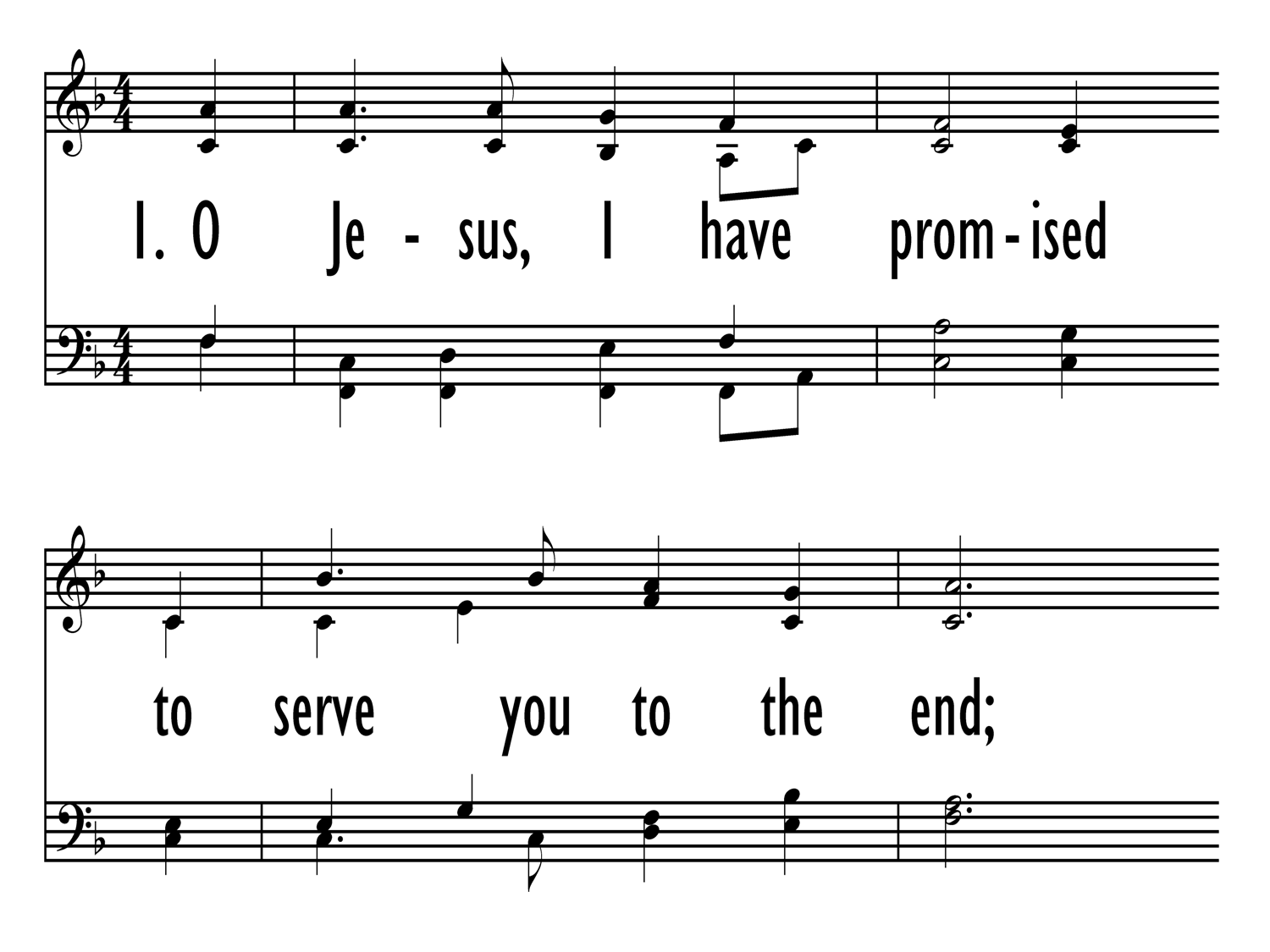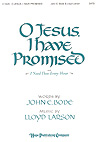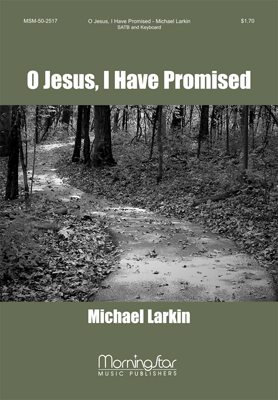- |
User Links
352
O Jesus, I Have Promised
Hymn Information
- First Line
- O Jesus, I have promised
- Author
- John Ernest Bode (1869, alt.)
- Tune Name
- ANGEL'S STORY
- Composer
- Arthur H. Mann, 1850-1929
- Topic
- Discipleship · Jesus Christ: Friend · Perseverance · Walk with God
Copyright Information
- Text Copyright
- Public Domain
- Tune Copyright
- Public Domain
- Reprint/Projection Information
- Words and Music: The Words and Music are in the Public Domain; you do not need permission to project or reprint the Words and Music.
Full Text
Scripture References
Further Reflections on Scripture References
Nearly all hymnals, including the Psalter Hymnal, delete two of Bode's original six stanzas. The hymn originally began with the words "O Jesus, we have promised" and included a reference to Luke 9:57: "I will follow you wherever you go." The text, especially stanza 4, has been altered for publication in the Psalter Hymnal.
The word "promised" in stanza 1 refers to the vows taken at confirmation/ profession of faith. This hymn is a prayer for Christ's presence on the Christian pilgrimage–in the face of temptation and external sin (st. 2) and internal guilt (st. 3)–and it assures us that our promises (st. 1) come in response to the promises of Christ (st. 4) .
Psalter Hymnal Handbook
352
O Jesus, I Have Promised
Assurance
By Christ’s power
our old selves are crucified, put to death, and buried with him,
so that the evil desires of the flesh
may no longer rule us,
but that instead we may offer ourselves
as a sacrifice of gratitude to him.
—Heidelberg Catechism, Q&A 43
—
Worship Sourcebook Edition Two
352
O Jesus, I Have Promised
Tune Information
- Name
- ANGEL'S STORY
- Key
- F Major
- Meter
- 7.6.7.6 D
Recordings
352
O Jesus, I Have Promised
Hymn Story/Background
John E. Bode wrote this hymn of consecration in 1866 on the occasion of the confirmation (profession of faith and first communion) of his daughter and two sons. The text was printed in 1868 by the Society for the Promotion of Christian.
Knowledge in a leaflet entitled "A Hymn for the Newly Confirmed" and was later published in an appendix to that society's Psalms and Hymns (1869).
A lot of hymnals delete two of Bode's original six stanzas. The hymn originally began with the words "O Jesus, we have promised" and included a reference to Luke 9:57: "I will follow you wherever you go." The text, especially stanza 4, has been altered for publication in the Psalter Hymnal 1987.
The word "promised" in stanza 1 refers to the vows taken at confirmation/profession of faith. This hymn is a prayer for Christ's presence on the Christian pilgrimage–in the face of temptation and external sin (st. 2) and internal guilt (st. 3)–and it assures us that our promises (st. 1) come in response to the promises of Christ (st. 4) .
—
Cyberhymnal.org
Author Information
A fine student at Christ Church, Oxford, England, and a prominent scholar who gave the famous Bampton Lectures ("for the exposition and defense of the Christian faith") at Oxford in 1855, John E. Bode (b. St. Pancras, England, 1816; d. Castle Camps, Cambridgeshire, England, 1874) was a rector in Westwell, Oxfordshire, and in Castle Camps. This gifted poet and hymn writer published Hymns for the Gospel of the Day, for Each Sunday and Festivals of Our Lord in 1860.
—
Bert Polman
Composer Information
Arthur Henry Mann (b. Norwich, Norfolk, England May 16, 1850; d. Cambridge, England, November 19, 1929) graduated from New College, Oxford (MusB 1874, MusD 1882). He was a chorister and assistant organist at Norwich Cathedral, and after short stints playing the organ at St. Peter’s, Wolverhampton (1870); Tettenhall Parish Church (1871); and Beverley Minster (1875); he became the organist at King’s College Chapel, Cambridge (1876-1929), University Organist (1897-1929), and music master and organist at The Leys School, Cambridge (1894-1922). In addition to composing an oratorio and a number of hymn tunes, he was music editor of The Church of England Hymnal (1894).
—
Cyberhymnal.org
Suggestions or corrections? Contact us


 My Starred Hymns
My Starred Hymns





